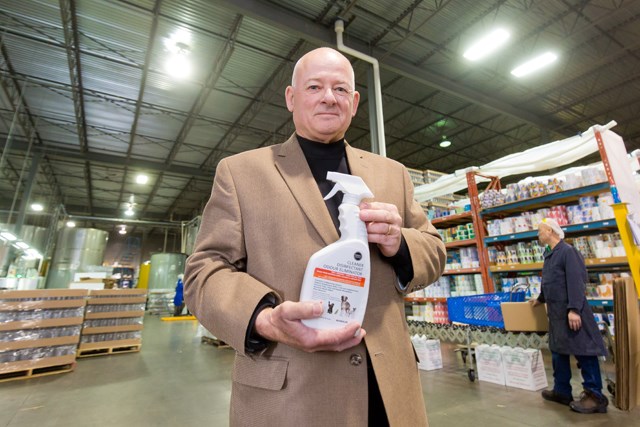It may be a little premature, but a Richmond-based company may have a weapon able to kill “that” smell wafting for miles across the city from time to time.
The blight of scores of residents, the foul stench emanating from Harvest Power’s composting facility in East Richmond could soon be a thing of the past.
EcoSolve Natural Products may have the answer to the years-old problem with a special banana tree extract, primarily designed to organically disinfect food manufacturing facilities.
The product, according to its vice-president Mahmoud Aziz, is already being used to successfully curb the often nauseous odours from similarly large composting centres in the Philippines.
And, although EcoSolve has only had preliminary discussions with Harvest Power, they can’t think of any reason why it won’t work in Richmond.
“It’s derived from a very specific species of banana bark from the Philippines,” said Aziz, from the company’s River Road headquarters in north Richmond.
“We import the banana bark concentrate and dilute it here in Richmond. Banana trees have special ingredients, which protect them from disease; they have natural anti-bacterial, anti-biotic, anti-fungal and anti-viral qualities.”
The product, explained Aziz, is effective at as low as two to three-per cent concentrate.
“They are using it in the Philippines at garbage dumps, at about three to six per cent concentrate, because it removes the odour and accelerates the composting,” he added.
“At Harvest Power, they could simply add it to the misting process that they have.”
As the volume of organic (food scraps) and green (garden refuse) waste being processed at Harvest Power has burgeoned over the last few years, the smell has increased to a level that the composting company, near No. 7 and Blundell roads, has had to retroactively apply to Metro Vancouver for permission to increase some emission limits by upwards of 1,000 per cent.
Asked why it has taken until now for EcoSolve to bring its product to the attention of Harvest, Aziz said it was only at the tail end of 2015 that he realized the magnitude of the odour issue in Richmond.
“I could smell it when I visited the Ironwood mall, but I didn’t think too much about it,” he said. “I would be very pleased if it solved the smell problem in Richmond,” he added.
James Spack, EcoSolve’s CEO and president, confirmed to The News that they’ve just opened up discussions (with Harvest Power) to see “what kind of effect our product might have. But we won’t know for sure until we test it out in their environment.
“It is a remarkable product, however. It has no smell, it leaves no smell and it kills the smell. I can’t think of any reason why it won’t work; it should just be a case of working out the concentration levels. They have the product to test.”
EcoSolve claims its product is a 100 per cent organic, water-based cleaner, disinfectant and deodorizer made with standardized extracts from the stem and leaves of a special strain of banana called musa paradisiacal.
Health Canada approved EcoSolve as being safe for the food processing area last year.
The cost to Harvest Power using EcoSolve “shouldn’t be a barrier,” said Aziz, noting that it’s used in the Philippines “which is, after all, still a developing country.”
When asked if it was aware such a product was being used in other parts of the globe, Harvest Power’s assistant regulatory compliance officer, Greg Gillespie, would only say, via email, that it continues “...to explore various options with regards to our Richmond facility and look forward to working with all stakeholders as part of our current air permit renewal application.”
EcoSolve, according to Spack, is poised to “impact on the cleaning and disinfectant area” with a product line called “EcoSolve Clean” to be released across all market segments, including industrial general use and the pet market.
Products, said Spack, for homes, offices, restaurants, medical clinics and hospitals will follow soon after.
The odours from the facility have been getting up the noses of some Richmond residents — a few reporting health issues — since Metro Vancouver started diverting organic and green waste away from landfills in 2012 and into Harvest’s composting facility instead.
Metro Vancouver, which issues air contaminant permits, has said that, before it renews Harvest Power’s permit, it will be “negotiating” with the U.S.-based company to mitigate the odours as much as possible.
Harvest Power told The News last November that it’s doing all it can do to reduce the odours — coming mainly from VOCs (volatile organic compounds) — with the technology available.
Scott Kerr, Harvest Power’s Richmond-based regional regulatory compliance officer for Canada, said late last year that the company has requested the new emission limits based on data it has collected over the last two years.
Several cities, including Richmond, send their organic and green waste to Harvest and Metro Vancouver has a contract for material collected at the North Shore Transfer Station and for green waste from the Langley and Maple Ridge transfer stations.



